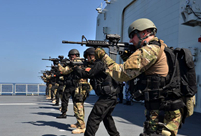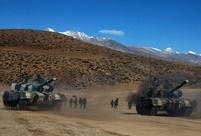 Army aviation: Adding wings to infantry
Army aviation: Adding wings to infantry
 Old photos of Chinese President Xi Jinping’s father and his families
Old photos of Chinese President Xi Jinping’s father and his families
 Bikini show in 2014 China Final of Miss Tourism World
Bikini show in 2014 China Final of Miss Tourism World
 Close-up view of August Aerobatic Team
Close-up view of August Aerobatic Team
 Goddesses married in 2014
Goddesses married in 2014
 Polar region photos raise worldwide awareness of global warming
Polar region photos raise worldwide awareness of global warming
 Get off at the last stop — Beijing Subway in vision
Get off at the last stop — Beijing Subway in vision
 Top 100 beauties in the world!
Top 100 beauties in the world!
 Gallery: Who is the most beautiful one?
Gallery: Who is the most beautiful one?
 If you like autumn, put your hands in the air!
If you like autumn, put your hands in the air!
BEIJING, Dec. 30 -- The following are the top 10 world news events in the year 2014 selected by Xinhua:
1. New highlights in China's diplomacy
In early February, Chinese President Xi Jinping attended the opening ceremony of the Sochi Winter Olympic Games in Russia, opening a new chapter in the Chinese diplomacy.
Over the year, Chinese leaders paid visits to countries in Asia, Africa, Europe, Latin America, Oceania, building a network of global partnership and promoting the initiatives of the Silk Road Economic Belt and the 21st Century Maritime Silk Road.
China successfully hosted a summit of the Conference on Interaction and Confidence Building Measures in Asia (CICA) in May, as well as the annual Asia-Pacific Economic Cooperation (APEC) Economic Leaders' Meeting in November, which have achieved fruitful results and produced a far-reaching influence.
China has also been actively pushing for a solution to the Iranian nuclear issue and the Ukraine crisis, playing the role as a responsible major power.
Chinese leaders have called for a new international relationship with win-win cooperation as its core, advocated a common, comprehensive, cooperative and sustainable security strategy, boosted the construction of a new type of major-country relations, and implemented a neighborhood policy featuring amity, sincerity, mutual benefit and inclusiveness, as well as guidelines on relations of sincerity with Africa.
2. Global concerted efforts to fight Ebola
In February, an Ebola epidemic broke out in Guinea and later spread to Sierra Leone and Liberia, while other countries also reported infection cases. By Dec. 24, the epidemic has claimed 7,573 lives worldwide.
In order to fight the largest ever outbreak of this disease, relevant countries have made positive responses and the international community has offered them numerous aid, which has led to the alleviation of the epidemic situation.
China provided its aid in the first time and so far has sent successively several medical teams and four batches of emergency aid worth a total of 750 million RMB (around 120.6 million U.S. dollars) to the epidemic-hit countries, becoming one of the biggest donors to the infected areas and playing an important role in coping with the epidemic.
3. Ukrainian crisis impacts Russia-West ties
On Feb. 22, Ukraine saw a sudden change in its political situation, in which then President Viktor Yanukovych was dismissed from his post and the opposition took full control of the country's power.
On March 16, the Republic of Crimea held a referendum and proclaimed separation from Ukraine and joining the Russian Federation. Several regions in eastern Ukraine also held referendums to declare "independence" successively, but the Ukrainian government refused to recognize the referendum results.
Since then armed conflicts between Ukraine's government troops and eastern rebellious militants have lasted for months.
On Sept. 5, the Ukrainian government, the eastern militants' leadership, Russia and the Organization for Security and Cooperation in Europe (OSCE) reached a truce.
However, since the outbreak of the Ukrainian crisis, Western countries have imposed a series of severe sanctions on Russia, while Moscow has taken retaliatory measures in response. The friction has comprehensively escalated, which has plunged Russia's relations with the United States and the European Union to a new low.
4. Malaysia Airlines flights gets lost mysteriously
On March 8, Malaysia Airlines (MAS) flight MH370, which carried 239 people including 154 Chinese passengers on a trip from Kuala Lumpur to Beijing, lost contact shortly after it took off. Despite the unprecedented efforts by Malaysia, China, Australia, the United States and many other countries in search of the aircraft, its whereabouts still remain unknown so far.
On July 17, another MAS flight MH17 flying from Amsterdam to Kuala Lumpur crashed in eastern Ukraine, killing all 298 people on board. Preliminary investigation report said that MH17 was penetrated by "high-energy objects from outside." Yet, so far no one claimed responsibility for the accident.
On Dec. 28, budget airliner AirAsia's flight 8501 traveling from the Indonesian city of Surabaya to Singapore lost radar contact in poor weather. The missing plane has 162 people on board.
5. South Korean ferry Sewol capsizes
On April 16, South Korean ferry Sewol carrying 476 people capsized and sank off the country's southwestern coast, leaving 295 dead, including four Chinese nationals, and nine missing. The poor rescue performance, irregular business operation and negligence of duties exposed by the accident were widely criticized in South Korea.
Due to the deadly ferry sinking, South Korean Prime Minister Chung Hong-won resigned, President Park Geun-hye apologized to the nation with tears in her eyes, the Maritime Police Department was dissolved, and the related crew or staff of the sunken ferry and its operator Chonghaejin Marine were prosecuted on criminal charges.
6. IS poses new regional, global security challenges
Since June, the extremist organization Islamic State (IS) has captured vast territories in western and northern Iraq and eastern Syria, and announced setup of an "Islamic State" in the areas under their control. The IS persecuted and executed prisoners of war and hostages of many countries and recruited militants, which has brought new challenges to regional and international security and anti-terrorism efforts as well.
Western countries could hardly absolve themselves from the blame that their current strategies and policies in a way contributed to the rise of the IS and increasing disturbances in the Middle East.
7. Ferguson case exposes racial discrimination in U.S.
On Aug. 9, Michael Brown, a 18-year-old black man, was fatally shot by white police officer Darren Wilson in the Ferguson County in the U.S. state of Missouri, after he committed robbery at a convenience store. Police then confirmed that the black teenager was unarmed. Brown's death has stirred weeks of protests in Ferguson and other regions in the United States. Later, the protests turned into riots in some places.
On Nov. 24, a grand jury decided not to indict Wilson, which stoked outrage and protests in several cities in the country again.
The Ferguson case, which exposed severe racial discrimination in American society, has drawn wide attention of the international community. It demonstrated the country's serious drawbacks in its political and judicial system, aggravating social differentiation, and a growing wealth gap. The case has also shown how the U.S. people at the bottom were choked in pursuit of their American Dream.
8. China, Japan reach consensus on improving ties
On Nov. 7, China and Japan reached a four-point agreement to improve bilateral ties. Three days later, Chinese President Xi Jinping and Japanese Prime Minister Shinzo Abe held a meeting at the request of the Japanese side ahead of the 22nd Asia-Pacific Economic Cooperation (APEC) Economic Leaders' Meeting. This is the first meeting between the two countries' leaders in over two years as China-Japan ties have encountered severe difficulties due to Japan's misconduct.
People expected that the Japanese side could stick to its commitments, honor the spirit of the four-point agreement, adopt a cautious military security policy, and take concrete actions to build China-Japan political mutual trust to gradually push the bilateral ties back on a path of healthy development.
9. The U.S. and Cuba start normalization of relations
On Dec.17, the United States and Cuba announced Wednesday that they have agreed to hold consultations on the restoration of their diplomatic relations, thus starting the normalization process of relations between the two countries.
After the Cuban revolution in 1959 which brought Fidel Castro to power, the U.S. had been adopting a hostile attitude toward Cuba. Washington severed ties with Havana in 1961, after the U.S.-sponsored Bay of Pigs invasion to topple Castro failed. In 1962, the U.S. officially announced imposing an economic embargo against Cuba. The long-term U.S. economic sanctions against Cuba have incurred strong opposition by the international community.
The start of ties normalization between the U.S. and Cuba marks the failure of the 53-year U.S. isolation policy against Cuba, and will have a significant impact on the global geopolitics.
10. Belt and Road Initiatives in pragmatic cooperation
By the end of 2014, China's initiatives of building the Silk Road Economic Belt and the 21st Century Maritime Silk Road, or briefly the Belt and Road, which connect the Asia-Pacific economic zone in the east and the European economic zone in the west, have received positive responses and participation of more than 50 countries related.
Over the past year, Chinese leaders have made various "road show" visits to the peripheral countries, and mechanisms like the Asian Infrastructure Investment Bank and the Silk Road Fund have been ushered in one after another.
The Belt and Road construction goes ahead steadily and enters the phase of pragmatic cooperation. It will vigorously boost the economic development of the peripheral countries as well as the whole world.
 Tempting Yunnan cuisine
Tempting Yunnan cuisine Joint anti-piracy drill
Joint anti-piracy drill PLA conducts tactical drill in Tibet
PLA conducts tactical drill in Tibet Beautiful Chinese woman
Beautiful Chinese woman Chestnut girl goes viral online
Chestnut girl goes viral online Time travel photos become a hit in military academies
Time travel photos become a hit in military academies Unknown 'monster' fish caught in Shandong
Unknown 'monster' fish caught in Shandong 20 years on: Relocated Three Gorges residents through lens
20 years on: Relocated Three Gorges residents through lens PLA HK Garrison veterans leave behind beautiful smiles
PLA HK Garrison veterans leave behind beautiful smiles New rules imposed on interbank deposits
New rules imposed on interbank deposits Mega project water arrives in Beijing
Mega project water arrives in Beijing Demonizing mega projects deters progress
Demonizing mega projects deters progress China steps up its overseas publicity efforts to mitigate negative reports on Tibet
China steps up its overseas publicity efforts to mitigate negative reports on TibetDay|Week|Month